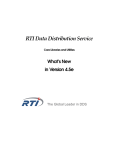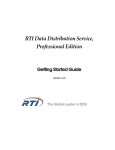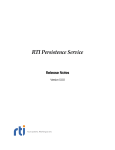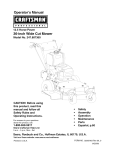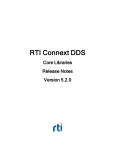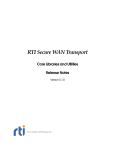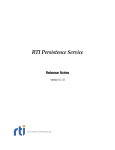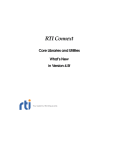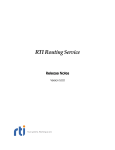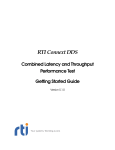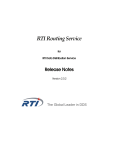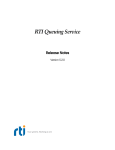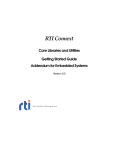Download Release Notes - Community RTI Connext Users
Transcript
RTI Data Distribution Service The Real-Time Publish-Subscribe Middleware Release Notes Version 4.5d The Global Leader in DDS © 2011 Real-Time Innovations, Inc. All rights reserved. Printed in U.S.A. First printing. Jan. 2011. Trademarks Real-Time Innovations and RTI are registered trademarks of Real-Time Innovations, Inc. All other trademarks used in this document are the property of their respective owners. Copy and Use Restrictions No part of this publication may be reproduced, stored in a retrieval system, or transmitted in any form (including electronic, mechanical, photocopy, and facsimile) without the prior written permission of Real-Time Innovations, Inc. The software described in this document is furnished under and subject to the RTI software license agreement. The software may be used or copied only under the terms of the license agreement. Technical Support Real-Time Innovations, Inc. 385 Moffett Park Drive Sunnyvale, CA 94089 Phone: (408) 990-7444 Email: [email protected] Website: https://support.rti.com/ Contents 1 System Requirements .................................................................................................2 1.1 Supported Operating Systems ...................................................................................................... 2 1.2 Platforms Removed from RTI Data Distribution Service 4.5b.................................................. 5 1.3 Disk and Memory Usage ............................................................................................................... 5 1.4 Networking Support....................................................................................................................... 5 2 Compatibility .............................................................................................................15 2.1 Wire Protocol Compatibility........................................................................................................ 15 2.1.1 General Information on RTPS (All Releases) ................................................................. 15 2.1.2 Release-Specific Information for RTI Data Distribution Service 4.5 ........................... 15 2.2 Code Compatibility....................................................................................................................... 16 2.2.1 General Information (All Releases) ................................................................................. 16 2.2.2 Release-Specific Information for RTI Data Distribution Service 4.5 ........................... 17 2.3 Data-Format Compatibility and Extensibility .......................................................................... 22 2.4 ODBC Database Compatibility ................................................................................................... 22 2.5 Build Compatibility ...................................................................................................................... 23 2.5.1 Windows CE C/C++ Build Compatibility ..................................................................... 23 3 What’s Fixed in 4.5d ..................................................................................................23 3.1 Fixes Related to Reliability .......................................................................................................... 24 3.1.1 Unnecessary Reliability Protocol Traffic from Reliable Reader if Writer Never Wrote Samples .................................................................................................................... 24 3.1.2 Failure when Using a Reliable Asynchronous Publisher with Disabled Positive ACKs .................................................................................................................................... 24 3.1.3 Dynamic Send Window Stuck at Minimum Size .......................................................... 24 3.1.4 Piggyback Heartbeats Not Always Sent When Send Window Enabled.................... 24 3.1.5 RELIABLE_READER_ACTIVITY_CHANGED StatusCondition Never Reset ........ 25 3.1.6 Undocumented Behavior That Finite Send Window Caused KEEP_LAST DataWriters to Block and Potentilaly Fail on Write...................................................... 25 iii iv 3.2 Fixes Related to Durability...........................................................................................................25 3.2.1 Lost Samples in Late-Joining Reader when using Keyed Topic and KEEP_LAST History .................................................................................................................................25 3.2.2 Slow Restore Operation when using Keyed Topics and dds.data_writer.history.odbc_plugin.in_memory_state Set to 1 ................................26 3.3 Fixes Related to QueryConditions and ReadConditions ........................................................26 3.3.1 Loss of StateMask Values During QueryCondition’s set_query_parameters() ........26 3.4 Fixes Related to rtiddsgen............................................................................................................26 3.4.1 Error Parsing XML Unions with Enums as Discriminators—C API Only ................26 3.4.2 Some Constants Generated with -convertToXML were not Language-Neutral.......27 3.4.3 Use of Keyword ‘any’ in IDL Resulted in Code that Did Not Compile.....................27 3.4.4 USER_QOS_PROFILE.XML Not Generated for Mac OS X Platform .........................27 3.4.5 Error when Running rtiddsgen with Java Option and XSD in Another Directory ..27 3.4.6 Incorrect Code Generated if XSD Enumerations had Non-Ordinal Annotations ....28 3.4.7 Incorrect XML Generated When Using Some Preprocessors ......................................28 3.4.8 Error from rtiddsgen if IDL File Contained Unicode non-ASCII Characters............28 3.4.9 Issues when using rtiddsgen -D Incorrectly...................................................................28 3.4.10 Wrong Visual Studio Properties for Hello_idl Example and Generated Examples .29 3.4.11 Error Parsing XML Typedefs with Non-Literal Dimensions .......................................29 3.4.12 Incorrect Const Enums when Using rtiddsgen -package option ................................29 3.4.13 Error Running rtiddsgen for Some Linux Distributions ..............................................30 3.4.14 Incorrect Type Code Name when Using -package........................................................30 3.4.15 Incorrect Case Values for Unions with Enum Discriminators.....................................30 3.4.16 Compiler Error if IDL Union had Field Named ‘result’ or ‘value’—Java API Only 31 3.4.17 Inconsistent Header Files Created When Generating Code for C or C++ .................31 3.5 Fixes Related to TCP Transport ...................................................................................................31 3.5.1 TCP Transport Plugin Aborted During Participant Restart.........................................31 3.5.2 Possible Crash after Error in TCP Transport Protocol ..................................................31 3.5.3 Segmentation Fault if TCP Transport Failed to Create Socket ....................................32 3.6 Fixes Related to QoS and Status..................................................................................................32 3.6.1 Incorrect uncommitted_sample_count Status Caused ‘!precondition’ Exception or Crash................................................................................................................................32 3.6.2 Use of cpu_list in Thread Settings May Have Caused Memory Corruption.............32 3.6.3 Some Participant Properties not Propagated, Serialization Error Reported .............33 3.6.4 Fields in DataWriterProtocolStatus Not Properly Filled In .........................................33 3.6.5 Partition Matching Errors after Partition is Changed................................................... 33 3.7 Fixes Related to Dynamic Data in Java API .............................................................................. 33 3.7.1 DynamicData.get_string() Failed When Using Member ID—Java API Only ........... 33 3.7.2 Setting of Unsigned Types Not Supported with Dynamic Data API— Java API Only ..................................................................................................................... 34 3.8 Fixes Related to ContentFilteredTopics ..................................................................................... 34 3.8.1 Best-Effort Writer-Side Content-Filtered Samples Reported As Lost ........................ 34 3.8.2 Reliable Content-Filtering Writer May Have Incorrectly Inactivated Reader .......... 35 3.8.3 No Warning if contentfilter_property_max_length was Too Small ........................... 35 3.8.4 Improper Serialization of content_filter_property for SubscriptionBuiltinTopicData .......................................................................................... 35 3.8.5 Failure When Immediately Resending Writer-side Content-Filtered Sample .......... 35 3.9 Other Fixes ..................................................................................................................................... 36 3.9.1 Dispose Samples not Generated for Remote Participant's Contained Entities After Ungraceful Termination.......................................................................................... 36 3.9.2 Error when Using Separate Threads to Enable Participant and Create DataReader at the Same Time .......................................................................................... 36 3.9.3 Wrong Behavior for Null Listener with Non-Null Mask—Java API Only................ 36 3.9.4 DATA_ON_READERS Status not Reset on Call to take()............................................ 36 3.9.5 Problem Redirecting Logging to File During DomainParticipantFactory Deletion. 36 3.9.6 Memory In Use After DDS Application Exited—C++ API Only................................ 37 3.9.7 Reader Blocked Indefinitely when Writers Sent Large Data ....................................... 37 3.9.8 Multichannel DataWriter did not Use Multicast if DataReader had not Defined a Content Filter ................................................................................................................... 37 3.9.9 Possible Crash when Configuring DataWriter to Use Asynchronous Publisher ..... 37 3.9.10 Error Message if Type Code Max. Serialized Length > 65532 ..................................... 37 3.9.11 DataReaderProtocolStatus.first_unacknowledged_sample_subscription_handle not Always Updated.......................................................................................................... 37 3.9.12 Crash after Setting Logging Delegate while Monitoring Enabled—.Net API Only. 38 3.9.13 Visual Studio 6.0 on Windows 2000 was not Supported.............................................. 38 3.9.14 Sequence-number in Statuses Displayed as Negative Values for Best-effort DataWriters ......................................................................................................................... 38 3.9.15 Unnecessary Exception When Monitoring DataWriter with Transient or Persistent Durability .......................................................................................................... 38 v 4 Known Issues .............................................................................................................39 4.1 Estimate of Message Overhead For Large Data May Be Exceeded .......................................39 4.2 Writer-side Filtering May Cause a Deadline to be Missed......................................................39 4.3 Disabled Interfaces on Windows Systems .................................................................................39 4.4 Wrong Error Code After Timeout on write() from Asynchronous Publisher ......................39 4.5 Incorrect Content Filtering for Valuetypes and Sparse Types ................................................39 4.6 Multi-dimensional Arrays of Sequences Not Supported when Generating .NET Code....40 4.7 License File may not be Found if NDDSHOME Set with Quotation Marks ........................40 4.8 Errors when Using Monitoring Library and Long Names/Values in PropertyQosPolicy 40 4.9 Changes Required when Using More than 5 Content-Filter Parameters..............................41 4.10 Issues with Dynamic Data ...........................................................................................................41 vi Release Notes This document includes the following sections: ❏ ❏ ❏ ❏ System Requirements (Section 1) Compatibility (Section 2) What’s Fixed in 4.5d (Section 3) Known Issues (Section 4) For an overview of new features, please see the What’s New document (RTI_DDS_WhatsNew.pdf). For more information, visit the RTI Knowledge Base, accessible from https://support.rti.com/, to see sample code, general information on RTI® Data Distribution Service, performance information, troubleshooting tips, and technical details. By its very nature, the knowledge base is continuously evolving and improving. We hope that you will find it helpful. If there are questions that you would like to see addressed or comments you would like to share, please send e-mail to [email protected]. We can only guarantee a response to customers with a current maintenance contract or subscription. You can purchase a maintenance contract or subscription by contacting your local RTI representative (see http://www.rti.com/company/contact.html), sending an e-mail request to [email protected], or calling +1 (408) 990-7400. 1 Release Notes 1 System Requirements 1.1 Supported Operating Systems RTI Data Distribution Service requires a multi-threaded operating system. This section describes the host and target systems supported by RTI Data Distribution Service. In this context, a host is the computer on which you will be developing a RTI Data Distribution Service application. A target is the computer on which the completed application will run. A host installation provides the code generation tool (rtiddsgen), examples and documentation, as well as the header files required to build an RTI Data Distribution Service application for any architecture. You will also need a target installation, which provides the libraries required to build an RTI Data Distribution Service application for that particular target architecture. Table 1.0 lists the platforms available with RTI Data Distribution Service 4.5d. Platforms Available with Release 4.5d Table 1.0 Platform Operating System Reference AIX® AIX 5.3 Table 1.1 on page 6 INTEGRITY® INTEGRITY 5.0 Table 1.2 on page 6 Linux® (Cell BE™) Fedora™ 9 Table 1.3 on page 6 CentOS 5.4, 5.5 Fedora 10 Red Hat® Enterprise Linux 3.0, 4.0, 5.0-5.2, 5.4, 5.5 Linux (Intel®) Red Hat Enterprise Linux 5.2 with Real-Time Extensions Table 1.4 on page 7 Red Hat Linux 8.0 and 9.0 SuSE® Linux Enterprise Server 10.1 (2.6 kernel) Ubuntu® Server 10.04 (2.6 kernel) Linux (PowerPC®) 2 SELinux (2.6.27.14) Yellow Dog™ Linux 4.0 Table 1.5 on page 8 LynxOS® LynxOS 4.0, LynxOS 4.2, LynxOS 5.0, LynxOS-SE 3.0, Table 1.6 on page 9 Mac OS® Mac OS X Table 1.7 on page 9 Solaris™ Solaris 2.9 and 2.10 Table 1.8 on page 9 VxWorks® VxWorks 5.4.2, 5.5.1, 6.0 - 6.7 Table 1.9 on page 10 1 System Requirements Table 1.0 Platforms Available with Release 4.5d Platform Operating System Reference Windows 7 Windows 2000 with service pack 2 or higher Windows 2003 and Windows 2003 x64 Edition Windows® Windows CE 6.0 Windows Vista® Table 1.10 on page 12 Windows Server 2008 R2 Windows XP Professional and Windows XP Professional x64 Edition Visual Studio® 2005 — Service Pack 1 Requirement ❏ You must have Visual Studio 2005 Service Pack 1 or the Microsoft Visual C++ 2005 SP1 Redistribution Package installed on the machine where you are running an application built with the release libraries of the following RTI architecture packages: • x64Win64VS2005 built with dynamic libraries • i86Win32VS2005 built with dynamic libraries • i86Win32jdk, x64Win64jdk, i86Win32dotnet2.0, and x64Win64dotnet2.0 The Microsoft Visual C++ 2005 Service Pack 1 Redistribution Package can be downloaded from RTI’s Customer Portal1, or obtained from the following Microsoft website: • For x86 architectures: http://www.microsoft.com/downloads/details.aspx? familyid=200B2FD9-AE1A-4A14-984D-389C36F85647&displaylang=en • For x64 architectures: http://www.microsoft.com/downloads/details.aspx? familyID=EB4EBE2D-33C0-4A47-9DD4-B9A6D7BD44DA&displaylang=en To run an application built with debug libraries of the above RTI architecture packages, you must have Visual Studio 2005 Service Pack 1 installed. 1. On the portal, select the Downloads page. The Redistribution Package is in the section labeled, “Windows Target Libraries for RTI Data Distribution Service.” 3 Release Notes Visual Studio 2008 - Service Pack 1 Requirement ❏ You must have Visual Studio 2008 Service Pack 1 or the Microsoft Visual C++ 2008 SP1 Redistribution Package installed on the machine where you are running an application built with the release libraries of the following RTI architecture packages: • x64Win64VS2008 built with dynamic libraries • i86Win32VS2008 built with dynamic libraries To run an application built with debug libraries of the above RTI architecture packages, you must have Visual Studio 2008 Service Pack 1 installed. The Microsoft Visual C++ 2008 Service Pack 1 Redistribution Package can be downloaded from RTI's Customer Portal1, or obtained from the following Microsoft website: • For x86 architectures: http://www.microsoft.com/downloads/details.aspx?familyid=A5C84275-3B97-4AB7-A40D-3802B2AF5FC2&displaylang=en • For x64 architectures: http://www.microsoft.com/downloads/details.aspx?FamilyID=ba9257ca-337f-4b40-8c14-157cfdffee4e&displaylang=en Note: Additional platforms not listed in this document may be supported through spe- cial development and maintenance agreements. Contact your RTI sales representative for details. The following tables provide additional details. See the RTI Data Distribution Service User’s Manual and Platform Notes for more information on compilers and linkers. ❏ ❏ ❏ ❏ ❏ ❏ ❏ ❏ ❏ ❏ 4 Table 1.1, “AIX Platforms,” on page 1-6 Table 1.2, “INTEGRITY Platforms,” on page 1-6 Table 1.3, “Linux Platforms on Cell BE CPUs,” on page 1-6 Table 1.4, “Linux Platforms on Intel and AMD CPUs,” on page 1-7 Table 1.5, “Linux Platforms on PowerPC CPUs,” on page 1-8 Table 1.6, “LynxOS Platforms,” on page 1-9 Table 1.7, “Mac OS Platforms,” on page 1-9 Table 1.8, “Solaris Platforms,” on page 1-9 Table 1.9, “VxWorks Platforms,” on page 1-10 Table 1.10, “Windows Architectures,” on page 1-12 1 System Requirements 1.2 Platforms Removed from RTI Data Distribution Service 4.5b Beginning with 4.5b, these platforms are no longer supported: ❏ ❏ ❏ ❏ ❏ ❏ ❏ 1.3 Fedora 8 (ppc64Linux2.6gcc4.1.2) J2SE 1.4 for most platforms LynxOS 4.0 on i86 CPUs for gcc 2.95.3 (i86Lynx4.0.0gcc2.95.3) LynxOS 4.2 on PPC 604 and PPC 7XX for gcc 3.2.2 (ppc750Lynx4.2.0gcc3.2.2) QNX Neutrino 6.3.0 Solaris 2.8 Solaris 2.9 on UltraSPARC for CC 5.3 (sparcSol2.9cc5.3) Disk and Memory Usage Disk usage for a typical host-only installation is approximately 250 MB. Each additional architecture (host or target) requires an additional 75 MB. We recommend that you have at least 256 MB RAM installed on your host development system. The target requirements are significantly smaller and they depend on the complexity of your application and hardware architecture. 1.4 Networking Support RTI Data Distribution Service includes full support for pluggable transports. RTI Data Distribution Service applications can run over various communication media, such as UDP/IP over Ethernet, and local inter-process shared memory—provided the correct "transport plug-ins" for the media are installed. By default, RTI Data Distribution Service uses the UDP/IPv4 and shared-memory transport plug-ins. The shared memory transport is not supported for VxWorks 5.4 and 5.5. A built-in IPv6 transport is also available (disabled by default) for these platforms: ❏ Linux/Fedora: all platforms except Red Hat Linux 8.0 and 9.0, and SELinux ❏ Solaris: all platforms ❏ Windows: all platforms except Windows CE and Visual C 6.0/7.0 A TCP transport is also available (but is not a built-in transport) for the following platforms: ❏ RedHat Enterprise Linux 4.0, 5.0-5.2, 5.4, 5.5; CentOS 5.4, 5.4; and Ubuntu 10.04 ❏ Windows with Visual Studio 2005, 2008, and 2010. 5 Release Notes Supported architectures appear on the following pages, followed by Compatibility (Section 2). Table 1.1 AIX Platforms Operating System CPU Compiler POWER5 (32-bit mode) AIX 5.3 POWER5 (64-bit mode) Table 1.2 RTI Architecture Abbreviation IBM XLC for AIX v9.0 p5AIX5.3xlc9.0 IBM Java 1.6 p5AIX5.3xlc9.0jdk IBM XLC for AIX v9.0 64p5AIX5.3xlc9.0 IBM Java 1.6 64p5AIX5.3xlc9.0jdk INTEGRITY Platforms Operating System INTEGRITY 5.0.7 IP Stack1 CPU PPC 74XX RTI Architecture Abbreviation InterNiche (GHnet1) TCP/IP stack ppc7400Inty5.0.7.mvme5100-7400 2 Interpeak TCP/IP stack with multicast ppc7400Inty5.0.7.mvme5100-7400-ipk INTEGRITY 5.0.8 PPC 74XX InterNiche (GHnet1) TCP/IP stack ppc7400Inty5.0.7.mvme5100-74002 INTEGRITY 5.0.9, 5.0.10 PPC 74XX GHnet2 TCP/IP stack ppc7400Inty5.0.9.mvme5100-7400-ghnet2 1. For additional supported transports, see the online documentation or contact [email protected]. 2. INTEGRITY 5.0.7 and 5.0.8 share the same architecture (ppc7400Inty5.0.7.mvme5100-7400). Table 1.3 Linux Platforms on Cell BE CPUs Operating System Fedora 9 (2.6 kernel) 6 CPU Cell BE Compiler RTI Architecture Abbreviation ppu 4.1.1 cell64Linux2.6ppu4.1.1 IBM Java JDK 1.5 cell64Linux2.6ppu4.1.1jdk 1 System Requirements Table 1.4 Linux Platforms on Intel and AMD CPUs Operating System CPU Pentium class CentOS 5.4, 5.5 (2.6 kernel) x64 Red Hat Linux 8.0 (2.4 kernel) Pentium class Red Hat Linux 9.0 (2.4 kernel) Pentium class Red Hat Enterprise Linux 3.0 (2.4 kernel) Pentium class AMD64 Red Hat Enterprise Linux 4.0 (2.6 kernel) Red Hat Enterprise Linux 5.0 (2.6 kernel) gcc 4.1.2 Pentium class x86_64 and AMD64 Pentium class x86_64 and AMD64 RTI Architecture Abbreviation i86Linux2.6gcc4.1.2 Sun Java Platform Standard i86Linux2.6gcc4.1.2jdk Edition JDK 1.6 gcc 4.1.2 x64 Fedora 10 (2.6 kernel) Compiler x64Linux2.6gcc4.1.2 Sun Java Platform Standard x64Linux2.6gcc4.1.2jdk Edition JDK 1.6 gcc 4.3.2 x64Linux2.6gcc4.3.2 IBM Java JDK 1.6 x64Linux2.6gcc4.3.2jdk gcc 3.2 i86Linux2.4gcc3.2 Sun Java Platform Standard Edition JDK 1.5 and 1.6 i86Linux2.4gcc3.2jdk gcc 3.2.2 i86Linux2.4gcc3.2.21 Sun Java Platform Standard Edition JDK 1.5 and 1.6 i86Linux2.4gcc3.2.2jdk gcc 3.2.2 i86Linux2.4gcc3.2.21 Sun Java Platform Standard Edition JDK 1.5 and 1.6 i86Linux2.4gcc3.2.2jdk gcc 3.2.3 x64Linux2.4gcc3.2.3 Sun Java Platform Standard Edition JDK 1.5 and 1.6 x64Linux2.4gcc3.2.3jdk gcc 3.4.3 i86Linux2.6gcc3.4.3 Sun Java Platform Standard Edition JDK 1.5 and 1.6 i86Linux2.6gcc3.4.3jdk gcc 3.4.5 x64Linux2.6gcc3.4.5 Sun Java Platform Standard Edition JDK 1.5 and 1.6 x64Linux2.6gcc3.4.5jdk gcc 4.1.1 i86Linux2.6gcc4.1.1 Sun Java Platform Standard Edition JDK 1.5 and 1.6 i86Linux2.6gcc4.1.1jdk gcc 4.1.1 x64Linux2.6gcc4.1.1 Sun Java Platform Standard Edition JDK 1.5 and 1.6 x64Linux2.6gcc4.1.1jdk 7 Release Notes Table 1.4 Linux Platforms on Intel and AMD CPUs Operating System Red Hat Enterprise Linux 5.1, 5.2, 5.4, 5.5 (2.6 kernel) CPU Pentium class x86_64 and AMD64 Red Hat Enterprise Linux 5.2 Pentium with Real-Time Extensions class (2.6 kernel) SUSE Linux Enterprise Server 10.1 (2.6 kernel) Pentium class AMD64 Ubuntu Server 10.04 (2.6 kernel) Pentium class x64 RTI Architecture Abbreviation Compiler gcc 4.1.2 i86Linux2.6gcc4.1.2 Sun Java Platform Standard i86Linux2.6gcc4.1.2jdk Edition JDK 1.6 gcc 4.1.2 x64Linux2.6gcc4.1.2 Sun Java Platform Standard x64Linux2.6gcc4.1.2jdk Edition JDK 1.6 gcc 4.1.2 i86Linux2.6gcc4.1.2 Sun Java Platform Standard i86Linux2.6gcc4.1.2jdk Edition JDK 1.5 and 1.6 gcc 4.1.0 i86Suse10.1gcc4.1.0 Sun Java Platform Standard Edition JDK 1.5 and 1.6 i86Suse10.1gcc4.1.0jdk gcc 4.1.0 x64Suse10.1gcc4.1.0 Sun Java Platform Standard Edition JDK 1.5 and 1.6 x64Suse10.1gcc4.1.0jdk gcc 4.4.3 i86Linux2.6gcc4.4.3 Sun Java Platform Standard Edition JDK 1.5 and 1.6 i86Linux2.6gcc4.4.3jdk gcc 4.4.3 x64Linux2.6gcc4.4.3 Sun Java Platform Standard Edition JDK 1.5 and 1.6 x64Linux2.6gcc4.4.3jdk 1. Red Hat Linux 9.0 and Red Hat Enterprise Linux 3.0 share the same RTI architecture. Table 1.5 Linux Platforms on PowerPC CPUs Operating System 8 CPU Compiler RTI Architecture Abbreviation SELinux (2.6.27.14) PowerPC440EP gcc 4.3.3 with ppc4xxFPLinux2.6gcc4.3.3 GNU libc 2.9 Yellow Dog® Linux 4.0 (2.6 kernel) (target only) PPC 74xx (such as 7410) gcc 3.3.3 ppc7400Linux2.6gcc3.3.3 1 System Requirements Table 1.6 LynxOS Platforms Operating System CPU i86Lynx4.0.0gcc3.2.2 Sun Java Platform Standard Edition JDK 1.4 i86Lynx4.0.0gcc3.2.2jdk gcc 3.2.2 ppc7400Lynx4.0.0gcc3.2.2 Sun Java Platform Standard Edition JDK 1.4 ppc7400Lynx4.0.0gcc3.2.2jdk PPC 604 gcc 3.2.2 ppc750Lynx4.0.0gcc3.2.2 PPC 7XX (such as 750) Sun Java Platform Standard Edition JDK 1.4 ppc750Lynx4.0.0gcc3.2.2jdk Pentium class gcc 3.2.2 i86Lynx4.2.0gcc3.2.2 PPC 74xx (such as 7410) gcc 3.2.2 ppc7400Lynx4.2.0gcc3.2.2 gcc 3.4.3 ppc7400Lynx5.0.0gcc3.4.3 Sun Java Platform Standard Edition JDK 1.4 ppc7400Lynx5.0.0gcc3.4.3jdk gcc 3.4.3 i86LynxOS_SE3.0.0gcc3.4.3 PPC 74xx (such as 7410) LynxOS 4.2 LynxOS 5.0 PPC 74xx (such as 7410) LynxOS-SE 3.0 Pentium class Table 1.7 Mac OS Platforms Operating System Mac OS X Table 1.8 RTI Architecture Abbreviation gcc 3.2.2 Pentium class LynxOS 4.0 Compiler CPU x64 Compiler RTI Architecture Abbreviation gcc 4.2.1 x64Darwin10gcc4.2.1 Java SE 1.6 for Mac OS x64Darwin10gcc4.2.1jdk Solaris Platforms Operating System CPU Pentium class Solaris 2.9 UltraSPARC Compiler gcc 3.3.2 RTI Architecture Abbreviation i86Sol2.9gcc3.3.2 Sun Java Platform Standard Edition JDK 1.5 and 1.6 i86Sol2.9jdk CC 5.4 (Forte Dev 7, Sun One Studio 7) sparcSol2.9cc5.4 gcc 3.2 sparcSol2.9gcc3.2 gcc 3.3 sparcSol2.9gcc3.3 Sun Java Platform Standard Edition JDK 1.5 and 1.6 sparcSol2.9jdk 9 Release Notes Table 1.8 Solaris Platforms Operating System CPU AMD64 Pentium class Solaris 2.10 UltraSPARC RTI Architecture Abbreviation Compiler gcc 3.4.3 x64Sol2.10gcc3.4.3 Sun Java Platform Standard Edition JDK 1.5 or 1.6 x64Sol2.10jdk gcc 3.4.4 i86Sol2.10gcc3.4.4 Sun Java Platform Standard Edition JDK 1.5 or 1.6 i86Sol2.10jdk gcc3.4.2 sparcSol2.10gcc3.4.2 Sun Java Platform Standard Edition JDK 1.5 or 1.6 sparcSol2.10jdk UltraScc 5.8 PARC (with gcc3.4.2 native 64-bit Sun Java Platform Standard Edition JDK 1.5 or 1.6 support) Table 1.9 sparc64Sol2.10gcc3.4.2 sparc64Sol2.10jdk VxWorks Platforms Operating System VxWorks 5.4.2 CPU ppc604, ppc750, ppc7400 Compiler gcc 2.96 Pentium VxWorks 5.5.1 ppc405 ppc604, ppc750, ppc7400 gcc 2.96 ppc405Vx5.5gcc ppc604Vx5.5gcc For kernel modules: pentiumVx6.0gcc3.3.2 gcc 3.3.2 Any Wind River PPC32 CPU with floating point hardware ppc604Vx5.4gcc ppc603Vx5.5gcc Pentium VxWorks 6.0, 6.1, 6.2 RTI Architecture Abbreviation pentiumVx5.5gcc ppc603 10 sparc64Sol2.10cc5.8 For Real Time Processes: pentiumVx6.0gcc3.3.2_rtp For kernel modules: ppc604Vx6.0gcc3.3.2 For Real Time Processes: ppc604Vx6.0gcc3.3.2_rtp 1 System Requirements Table 1.9 VxWorks Platforms Operating System CPU Compiler For kernel modules: pentiumVx6.3gcc3.4.4 Pentium VxWorks 6.3, 6.4 gcc 3.4.4 Any Wind River PPC32 CPU with floating point hardware Any Wind River PPC32 CPU with floating point hardware VxWorks 6.6 Any Wind River PPC32 CPU with floating point hardware ppc405 For kernel modules: ppc604Vx6.3gcc3.4.4 For kernel modules: pentiumVx6.5gcc3.4.4 gcc 3.4.4 Pentium For Real Time Processes: pentiumVx6.3gcc3.4.4_rtp For Real Time Processes: ppc604Vx6.3gcc3.4.4_rtp Pentium VxWorks 6.5 RTI Architecture Abbreviation For Real Time Processes: pentiumVx6.5gcc3.4.4_rtp For kernel modules: ppc604Vx6.5gcc3.4.4 For Real Time Processes: ppc604Vx6.5gcc3.4.4_rtp gcc 4.1.2 gcc 4.1.2 gcc 4.1.2 For Kernel Modules: pentiumVx6.6gcc4.1.2 For Real Time Processes: pentiumVx6.6gcc4.1.2_rtp For Kernel Modules: ppc604Vx6.6gcc4.1.2 For Real Time Processes: ppc604Vx6.6gcc4.1.2_rtp For Kernel Modules: ppc405Vx6.6gcc4.1.2 For Real Time Processes: ppc405Vx6.6gcc4.1.2_rtp 11 Release Notes Table 1.9 VxWorks Platforms Operating System CPU Pentium RTI Architecture Abbreviation Compiler gcc 4.1.2 For Kernel Modules: pentiumVx6.7gcc4.1.2 For Real Time Processes: pentiumVx6.7gcc4.1.2_rtp For Kernel Modules: ppc604Vx6.7gcc4.1.2 VxWorks 6.7 any Wind River PPC32 CPU with gcc 4.1.2 floating point hardware For Real Time Processes on a non-SMP system: ppc604Vx6.7gcc4.1.2_rtp For Real Time Processes on an SMP system: ppc604Vx6.7gcc4.1.2_smp ppc4051 gcc 4.1.2 For Kernel Modules: ppc405Vx6.6gcc4.1.2 For Real Time Processes: ppc405Vx6.6gcc4.1.2_rtp 1. For ppc405, the architecture string is the same for VxWorks 6.6 and 6.7. Table 1.10 Windows Architectures Operating System Windows 7 CPU x86 Windows 7 x64 x64 Edition 12 Compiler or Software Development Kit 1 2 RTI Architecture Visual Studio 2005 SP 1 (C++, C# 8.0 or 9.0) i86Win32dotnet2.0 Visual Studio 2010 i86Win32VS2010 Visual Studio 2010 (C++, C# 8.0 or 9.0) i86Win32dotnet4.0 Sun Java Platform Standard Edition JDK 1.5 or 1.6 i86Win32jdk Visual Studio 2005 SP 1 (C++, C# 8.0 or 9.0) x64Win64dotnet2.0 Visual Studio 2010 x64Win64VS2010 Visual Studio 2010 (C++, C# 8.0 or 9.0) x64Win64dotnet4.0 Sun Java Platform Standard Edition JDK 1.5 or 1.6 x64Win64jdk 1 System Requirements Table 1.10 Windows Architectures Operating System Windows 2000 Windows 2003 Windows 2003 x64 Edition Windows CE 6.0 (target only)3 4 5 Windows Server 2008 R2 x64 Edition Windows Vista CPU Compiler or Software Development Kit 1 2 RTI Architecture Visual C 6.0 i86Win32VC60 Visual C 7.0 i86Win32VC70 Visual Studio 2003 i86Win32VS2003 Visual Studio 2005 SP1 i86Win32VS2005 Visual Studio 2005 SP 1 (C++, C# 8.0 or 9.0) i86Win32dotnet2.0 Sun Java Platform Standard Edition JDK 1.5 or 1.6 i86Win32jdk Visual C 6.0 i86Win32VC60 Visual C 7.0 i86Win32VC70 Visual Studio 2003 i86Win32VS2003 Visual Studio 2005 SP 1 i86Win32VS2005 Visual Studio 2005 SP 1 (C++, C# 8.0 or 9.0) i86Win32dotnet2.0 Visual Studio 2008 SP1 i86Win32VS2008 Visual Studio 2008 SP 1 (C++, C# 8.0 or 9.0) i86Win32dotnet2.0 Sun Java Platform Standard Edition JDK 1.5 or 1.6 i86Win32jdk Visual Studio 2005 SP 1 x64Win64VS2005 Visual Studio 2005 SP 1 (C++, C# 8.0 or 9.0) x64Win64dotnet2.0 Visual Studio 2008 SP 1 x64Win64VS2008 Sun Java Platform Standard Edition JDK 1.5 or 1.6 x64Win64jdk armv4 Visual Studio 2005 SP 1 (C++ 8.0) armv4WinCE6.0VS2005 x86 Visual Studio 2005 SP 1 (C++ 8.0) i86WinCE6.0VS2005 Visual Studio 2005 SP 1 (C++, C# 8.0 or 9.0) x64Win64dotnet2.0 Visual Studio 2010 x64Win64VS2010 Visual Studio 2010 (C++, C# 8.0 or 9.0) x64Win64dotnet4.0 Sun Java Platform Standard Edition JDK 1.5 or 1.6 x64Win64jdk Visual Studio 2005 SP 1 i86Win32VS2005 Visual Studio 2005 SP 1 (C++, C# 8.0 or 9.0) i86Win32dotnet2.0 Visual Studio 2008 SP 1 i86Win32VS2008 Visual Studio 2008 SP 1 (C++, C# 8.0 or 9.0) i86Win32dotnet2.0 Sun Java Platform Standard Edition JDK 1.5 or 1.6 i86Win32jdk x86 x86 x64 x64 x86 13 Release Notes Table 1.10 Windows Architectures Operating System Windows Vista 64-bit Edition Windows XP Professional 6 Windows XP Professional x64 Edition CPU x64 x86 x64 Compiler or Software Development Kit 1 2 RTI Architecture Visual Studio 2005 SP 1 x64Win64VS2005 Visual Studio 2005 SP 1 (C++, C# 8.0 or 9.0) x64Win64dotnet2.0 Visual Studio 2008 SP1 x64Win64VS2008 Visual Studio 2008 SP 1 (C++, C# 8.0 or 9.0) x64Win32dotnet2.0 Sun Java Platform Standard Edition JDK 1.5 or 1.6 x64Win64jdk Visual C 6.0 i86Win32VC60 Visual C 7.0 i86Win32VC70 Visual Studio 2003 i86Win32VS2003 Visual Studio 2005 SP 1 i86Win32VS2005 Visual Studio 2005 SP 1 (C++, C# 8.0 or 9.0) i86Win32dotnet2.0 Visual Studio 2008 SP 1 i86Win32VS2008 Visual Studio 2008 SP 1 (C++, C# 8.0 or 9.0) i86Win32dotnet2.0 Sun Java Platform Standard Edition JDK 1.5 or 1.6 i86Win32jdk Visual Studio 2005 SP 1 x64Win64VS2005 Visual Studio 2005 SP 1 (C++, C# 8.0 or 9.0) x64Win64dotnet2.0 Visual Studio 2008 SP 1 x64Win64VS2008 Visual Studio 2008 SP 1 (C++, C# 8.0 or 9.0) x64Win32dotnet2.0 Sun Java Platform Standard Edition JDK 1.5 or 1.6 x64Win64jdk 1. On Windows XP: If you are using JDK 5.0 and want to use Intel’s HyperThreading technology, use JDK 5.0 Update 6 (build 1.5.0_06), which includes fixes to JNI and HyperThreading. (If you must use Update 5 (build 1.5.0_05), you should disable HyperThreading.) 2. The RTI .NET assemblies are supported for both the C++/CLI and C# languages. The type support code generated by rtiddsgen is in C++/CLI; compiling the generated type support code requires Microsoft Visual C++. Calling the assembly from C# requires Microsoft Visual C#. 3. The Windows CE network stack does not support the IP_TOS socket option. 4. The Windows CE device must be connected directly to the network, not through a Windows PC using ActiveSync. RTI Data Distribution Service does not support Windows CE when used with ActiveSync 5. On Windows CE systems, add registry values under HKEY_LOCAL_MACHINE\Software\RTI for the environment variables that RTI Data Distribution Service looks up. For example: To set NDDS_DISCOVERY_PEERS to 127.0.0.1, under "HKEY_LOCAL_MACHINE\Software\RTI", add a string value with the name "NDDS_DISCOVERY_PEERS" and data "127.0.0.1". 6. Windows XP does not support IP_TOS unless registry changes are made. See http://support.microsoft.com/kb/ 248611, http://www.microsoft.com/technet/technetmag/issues/2007/02/CableGuy/default.aspx. 14 2 Compatibility 2 Compatibility RTI strives to provide a seamless upgrade path when the product is updated. When upgrading to a new version of RTI Data Distribution Service, there are five components to consider: ❏ ❏ ❏ ❏ ❏ Wire Protocol Compatibility (Section 2.1) Code Compatibility (Section 2.2) Data-Format Compatibility and Extensibility (Section 2.3) ODBC Database Compatibility (Section 2.4) Build Compatibility (Section 2.5) 2.1 Wire Protocol Compatibility 2.1.1 General Information on RTPS (All Releases) RTI Data Distribution Service communicates over the wire using a formal Real-time Publish-Subscribe (RTPS) protocol. RTPS has been developed from the ground up with performance, interoperability and extensibility in mind. The RTPS protocol is an international standard managed by the OMG. The RTPS protocol has built-in extensibility mechanisms that enable new revisions to introduce new message types, extend the existing messages, or extend the Quality of Service settings in the product—without breaking interoperability. RTPS 1.0 was introduced in 2001. The current version is 2.1. RTI plans to maintain interoperability between middleware versions based on RTPS 2.x. 2.1.2 Release-Specific Information for RTI Data Distribution Service 4.5 RTI Data Distribution Service 4.5 is compatible with 4.2 - 4.4, except as noted below. 2.1.2.1 RTPS Versions RTI Data Distribution Service 4.5 supports RTPS 2.1. Earlier releases (4.2c and lower) supported RTPS 1. Because the two RTPS versions are incompatible with each other, applications built with 4.2e and higher will not interoperate with applications built using 4.2c or lower. 2.1.2.2 double, long long, unsigned long long or long double Wire Compatibility If your RTI Data Distribution Service 4.3 or higher application’s data type uses a ‘double,’ ‘long long,’ ‘unsigned long long,’ or ‘long double,’ it will not interoperate with RTI Data 15 Release Notes Distribution Service applications built with version 4.2e or lower, unless you use the -use42eAlignment flag when generating code with rtiddsgen. 2.1.2.3 Sending ‘Large Data’ between 4.4d and Older Releases The ‘large data’ format in RTI Data Distribution Service 4.2e, 4.3, 4.4b and 4.4c is not compliant with RTPS 2.1. ‘Large data’ refers to data that cannot be sent as a single packet by the transport. This issue has been resolved, starting with RTI Data Distribution Service 4.4d. As a result, by default, large data in RTI Data Distribution Service 4.4d and higher is not compatible with older versions. You can achieve backward compatibility by setting the following properties to "1". dds.data_writer.protocol.use_43_large_data_format dds.data_reader.protocol.use_43_large_data_format The properties can be set per DataWriter/DataReader or per DomainParticipant. For example: <participant_qos> <property> <value> <element> <name> dds.data_writer.protocol.use_43_large_data_format </name> <value>1</value> </element> <element> <name> dds.data_reader.protocol.use_43_large_data_format </name> <value>1</value> </element> </value> </participant_qos> 2.2 Code Compatibility 2.2.1 General Information (All Releases) RTI Data Distribution Service uses an API that is an extension of the OMG Data Distribution Service (DDS) standard API. RTI strives to maintain API compatibility between versions, but will conform to changes in the OMG DDS standard. 16 2 Compatibility RTI Data Distribution Service primarily consists of a library and a set of header files. In most cases, upgrading simply requires you to recompile your source using the new header files and link the new libraries. In some cases, minor modifications to your application code might be required; any such changes are noted in this document. RTI allows you to define the data types that will used to send and receive messages. To create code for a data type, RTI Data Distribution Service includes a tool called rtiddsgen. For input, rtiddsgen takes a data-type description (in IDL, XML, XSD, or WSDL format); rtiddsgen generates header files (or a class in Java) that can be used to send and receive data of the defined type. It also generates code that takes care of low-level details such as transforming the data into a machine-independent representation suitable for communication. While this is not the common case, some upgrades require you to regenerate the code produced by rtiddsgen. The regeneration process is very simple; you only need to run the new version of rtiddsgen using the original input IDL file. This process will regenerate the header and source files, which can then be compiled along with the rest of your application. 2.2.2 Release-Specific Information for RTI Data Distribution Service 4.5 2.2.2.4 Type Support and Generated Code Compatibility ❏ long long Native Data Type Support Starting with release 4.5c, we assume all platforms natively support the ‘long long’ data type. There is no longer a need to define RTI_CDR_SIZEOF_LONG_LONG to be 8 on some platforms in order to map the DDS ‘long long’ data type to a native ‘long long’ type. ❏ double, long long and unsigned long long Code Generation If your RTI Data Distribution Service 4.3 or higher application’s data type uses a ‘double,’ ‘long long,’ ‘unsigned long long,’ or ‘long double,’ it will not be backwards compatible with RTI Data Distribution Service applications built with version 4.2e or lower, unless you use the -use42eAlignment flag when generating code with rtiddsgen. ❏ Changes in Generated Type Support Code The rtiddsgen-generated type-support code for user-defined data type changed in 4.5 to facilitate some new features. If you have code that was generated using rtiddsgen 4.4 or lower, you must regenerate that code using the version of rtiddsgen provided with this release. 17 Release Notes ❏ Cross-Language Instance Lookup when Using Keyed Data Types In RTI Data Distribution Service 4.3, keys were serialized with the incorrect byte order when using the Java and .NET API for the user-defined data type, resulting in incorrect behavior in the lookup_instance() and get_key() methods when using keyed data-types to communicate between applications in these languages and other programming languages. This issue was resolved in Java starting in version 4.3e rev. 01 and starting in .NET in 4.4b. As a result of this change, systems using keyed data that incorporate Java or .NET applications using both 4.3 and this release could experience problems in the lookup_instance() and get_key() methods. If you are affected by this limitation, please contact RTI Support. This issue does not impact systems using 4.4 and higher versions, or 4.2 and lower versions of RTI Data Distribution Service. ❏ Data Type with Variable Size Keys If your data type contains more than one key field and at least one of the key fields except the last one is of variable size (for example, if you use a string followed by a long as the key): • RTI Data Distribution Service 4.3e, 4.4b or 4.4c DataWriters may not be compatible with RTI Data Distribution Service 4.4d or higher DataReaders. • RTI Data Distribution Service 4.3e, 4.4b or 4.4c DataReaders may not be compatible with RTI Data Distribution Service 4.4d or higher DataWriters. Specifically, all samples will be received in those cases, but you may experience the following problems: • Samples with the same key may be identified as different instances. (For the case in which the DataWriter uses 4.4d or higher, this can happen only if the DataWriter’s disable_inline_keyhash field (in the DataWriterProtocolQosPolicy) is true (this is not the default case). • Calling lookup_instance() on the DataReader may return HANDLE_NIL even if the instance exists. Please note that you probably would have had the same problem with this kind of data type already, even if both your DataWriter and DataReader were built with 4.3e, 4.4b or 4.4c. 18 2 Compatibility If you are using a C/C++ or Java IDL type that belongs to this data type category in your 4.3e, 4.4b or 4.4c application, you can resolve the backwards compatibility problem by regenerating the code with version of rtiddsgen distributed with RTI Data Distribution Service 4.4d. You can also upgrade your whole system to this release. 2.2.2.5 Other API and Behavior Changes ❏ New on_instance_replaced() method on DataWriterListener Starting with release 4.5c, there is a new DataWriterListener method, on_instance_replaced(), which supports the new instance replacement feature. This method provides notification that the maximum instances have been used and need to be replaced. If you are using a DataWriterListener from an older release, you may need to add this new method to your listener. ❏ Counts in Cache Status and Protocol Status changed from Long to Long Long Starting with release 4.5c, all the ‘count’ data types in DataReaderCacheStatus, DataReaderProtocolStatus, DataWriterCacheStatus and DataWriterProtocolStatus have been changed from ‘long’ to‘long long’ in the C, C++ and .NET APIs in order to report the correct value for DDS applications that run for very long periods of time. If you have an application written with a previous release that is accessing those fields, data-type changes may be necessary. ❏ Changes in RtpsReliableWriterProtocol_t Starting in release 4.4c, two fields in DDS_RtpsReliableWriterProtocol_t have been renamed: • Old name: disable_positive_acks_decrease_sample_keep_duration_scaler New name:disable_positive_acks_decrease_sample_keep_duration_factor • Old name: disable_positive_acks_increase_sample_keep_duration_scaler New name: disable_positive_acks_increase_sample_keep_duration_factor In releases prior to 4.4c, the NACK-only feature was not supported on platforms without floating-point support. Older versions of RTI Data Distribution Service will not run on these platforms because floats and doubles are used in the implementation of the NACK-only feature. In releases 4.4c and above, the NACK-only feature has been reimplemented to use fixed-point arithmetic and the new DDS_Long "factor" fields noted above, which replace the DDS_Double "scaler" fields. 19 Release Notes ❏ Tolerance for Destination-Ordering by Source-Timestamp Starting with release 4.4b, by default, RTI Data Distribution Service is less restrictive (compared to older releases) on the writer side with regards to timestamps between consecutive samples: if the timestamp of the current sample is less than the timestamp of the previous sample by a small tolerance amount, write() will succeed. If you are upgrading from RTI Data Distribution Service 4.4a or lower, and the application you are upgrading relied on the middleware to reject timestamps that ‘went backwards’ on the writer side (that is, when a sample’s timestamp was earlier than the previous sample’s), there are two ways to keep the previous, more restrictive behavior: • If your DestinationOrderQosPolicy’s kind is BY_SOURCE_TIMESTAMP: set the new field in source_timestamp_tolerance, to 0. the DestinationOrderQosPolicy, • If your DestinationOrderQosPolicy's kind is BY_RECEPTION_TIMESTAMP on the writer side, consider changing it to BY_SOURCE_TIMESTAMP instead and setting source_timestamp_tolerance to 0. However, this may not be desirable if you had a particular reason for using BY_RECEPTION_TIMESTAMP (perhaps because you did not want to match readers with BY_SOURCE_TIMESTAMP). If you need to keep the BY_RECEPTION_TIMESTAMP setting, there is no QoS setting that will give you the exact same behavior on the writer side as the previous release. Starting with release 4.4b, by default, RTI Data Distribution Service is more restrictive (compared to older releases) on the reader side with regards to source and reception timestamps of a sample if DestinationOrderQosPolicy kind is set to BY_SOURCE_TIMESTAMP: if the reception timestamp of the sample is less than the source timestamp by more than the tolerance amount, the sample will be rejected. If you are upgrading from RTI Data Distribution Service 4.4a or lower, your reader is using BY_SOURCE_TIMESTAMP, and you need the previous less restrictive behavior, set source_timestamp_tolerance to infinite on the reader side. ❏ New Location and Name for Default XML QoS Profiles File (formerly NDDS_QOS_PROFILES.xml) Starting with release 4.4d, the default XML QoS Profiles file has been renamed and is installed in a new directory: 20 2 Compatibility • Old location/name: $NDDSHOME/resource/xml/NDDS_QOS_PROFILES.xml • New location/name: $NDDSHOME/resource/qos_profiles_<version>/xml/ NDDS_QOS_PROFILES.example.xml (where <version can be 4.4d, for example) If you want to use this QoS profile, you need to set up your NDDSHOME environment variable at run time, and rename the file NDDS_QOS_PROFILES.example.xml to NDDS_QOS_PROFILES.xml (i.e., by default, even if your NDDSHOME environment variable is set, this QoS profile is not used.) See Section 15.2 in the User’s Manual for details. ❏ Changes in the default value for the max_objects_per_thread field Starting with release 4.4d, the default value for the max_objects_per_thread field in the SystemResourceLimitsQosPolicy has been changed from 512 to 1024. ❏ Type Change in Constructor for SampleInfoSeq—.NET Only Starting with release 4.5c, the constructor for SampleInfoSeq has been changed from SampleInfoSeq(UInt32 maxSamples) to SampleInfoSeq(Int32 maxSamples). This was to make it consistent with other sequences. ❏ Default Send Window Sizes Changed to Infinite • Starting with release 4.5d, the send window size of a DataWriter is set to infinite by default. This is done by changing the default values of two fields in DDS_RtpsReliableWriterProtocol_t (min_send_window_size, max_send_window_size) to be DDS_LENGTH_UNLIMITED. • In release 4.4d, the send window feature was introduced and was enabled by default in 4.5c (with min_send_window_size = 32, max_send_window_size = 256). For DataWriters with a HistoryQosPolicy kind of KEEP_LAST, enabling the send window could cause writes to block, and possibly fail due to blocking timeout. This blocking behavior changed the expected behavior of applications using default QoS. To preserve that preestablished non-blocking default behavior, the send window size has been changed to be infinite by default starting in release 4.5d. • Users wanting the performance benefits of a finite send window will now have to configure the send window explicitly. 21 Release Notes 2.3 Data-Format Compatibility and Extensibility With RTI Data Distribution Service, you can define your own data types, which will be used to communicate between applications on a network. Developers sometimes extend or modify their data types. When new fields are added, it is a common requirement that applications that use the extended types must still communicate with applications using the old types. To accomplish this, RTI provides a dynamic data API, which allows applications to define data types at runtime without code generation. Specifically, this API supports the concept of a sparse type, one for which every data sample need not contain a value for every field defined in the type. By dynamically defining a type as sparse, an application can add new fields to it later without breaking existing components that may be unable to fill in those new fields. For customers that may want to handle extensibility in a more custom way, such as with XML payloads or custom serialization and deserialization, RTI provides built-in string and opaque data types. 2.4 ODBC Database Compatibility To use the Durable Writer History and Durable Reader State features, you must install a relational database, such as Oracle TimesTen or MySQL. In principle, you can use any database that provides an ODBC driver, since ODBC is a standard. However, not all ODBC databases support the same feature set. Therefore, there is no guarantee that the persistent durability features will work with an arbitrary ODBC driver. Starting with version 4.5c, we have tested the following drivers: ❏ Oracle TimesTen 11.2.1 ❏ MySQL ODBC 5.1 Performance will be better with Oracle TimesTen, because it is an in-memory database. If you choose MySQL, you will also need the MySQL ODBC 5.1.6 (or higher) driver. For non-Windows platforms, UnixODBC 2.2.12 (or higher) is also required. The Durable Writer History and Durable Reader State features have been tested with the following architectures: ❏ AIX: p5AIX5.3xlc9.0, 64p5AIX5.3xlc9.0 (AIX architectures only support Oracle TimesTen) 22 3 What’s Fixed in 4.5d ❏ Linux: i86Linux2.6gcc3.4.3, x64Linux2.6gcc3.4.5; i86Linux2.6gcc4.1.1, x64Linux2.6gcc4.1.1; i86Linux2.6gcc4.4.3, x64Linux2.6gcc4.4.3 (gcc4.4.3 is only tested with MySQL) ❏ Solaris: sparcSol2.10gcc3.4.2 and sparc64Sol2.10gcc3.4.2 ❏ Windows: i86Win32VS2005, i86Win32VS2008, i86Win32VS2010, and x64Win64VS2010 For more information on database setup, please see the Addendum for Database Setup (RTI_DDS_GettingStarted_DatabaseAddendum.pdf). 2.5 Build Compatibility 2.5.1 Windows CE C/C++ Build Compatibility When building C/C++ applications on Windows CE systems, there is an additional dependency on Iphlpapi.lib that was not required with RTI Data Distribution Service 4.4d or previous releases. Therefore if you rebuild an existing 4.4d or older project, you will see the following link error for static builds. nddscorez[d].lib (Host.obj): error LNK2019: unresolved external symbol _GetAdaptersAddresses@20 referenced in function _RTIOsap.Host_getHWAddress*. To correct this error, you must add the new link dependency Iphlpapi.lib to the appropriate Visual Studio project. You can do this manually, or you can delete the project files that were created with 4.4d or older and then run rtiddsgen -example to replace them. 3 What’s Fixed in 4.5d This section includes: ❏ ❏ ❏ ❏ ❏ ❏ Fixes Related to Reliability (Section 3.1) Fixes Related to Durability (Section 3.2) Fixes Related to QueryConditions and ReadConditions (Section 3.3) Fixes Related to rtiddsgen (Section 3.4) Fixes Related to TCP Transport (Section 3.5) Fixes Related to QoS and Status (Section 3.6) 23 Release Notes ❏ Fixes Related to Dynamic Data in Java API (Section 3.7) ❏ Fixes Related to ContentFilteredTopics (Section 3.8) ❏ Other Fixes (Section 3.9) 3.1 Fixes Related to Reliability 3.1.1 Unnecessary Reliability Protocol Traffic from Reliable Reader if Writer Never Wrote Samples A reliable DataReader will periodically send reliability-protocol traffic until it receives confirmation from the DataWriter that it realizes the DataReader has received all the available samples. In the previous release, if the DataWriter never wrote any user-data samples, a reliable DataReader continued to send periodic reliability-protocol traffic until the DataWriter wrote its first user-data sample (even though the DataWriter indicated there was no data available before the first user-data sample was written). This issue has been resolved. [RTI Bug # 13180] 3.1.2 Failure when Using a Reliable Asynchronous Publisher with Disabled Positive ACKs A reliable asynchronous-publishing DataWriter with DDS_DataWriterProtocolQosPolicy.disable_positive_acks set to true would crash when asynchronously writing a sample. This problem has been resolved. [RTI Bug # 13523] 3.1.3 Dynamic Send Window Stuck at Minimum Size If a reliable DataWriter was configured to have a dynamic send-window size1, the send window size became stuck at the minimum size and did not grow dynamically. This caused the writer to block due to an unnecessarily small send window and throttled the sending of user data. This problem has been resolved. [RTI Bug # 13588] 3.1.4 Piggyback Heartbeats Not Always Sent When Send Window Enabled If a DataWriter used a finite send window size with an infinite writer queue size (that is, its resource_limits.max_samples was DDS_LENGTH_UNLIMITED or its writer_resource_limits.max_batches was DDS_LENGTH_UNLIMITED when batching was enabled), piggyback heartbeat messages were not sent when the DataWriter’s 1. A ‘dynamic send window size’ means min_send_window_size was not equal to max_send_window_size. 24 3 What’s Fixed in 4.5d protocol.rtps_reliable_writer.heartbeats_per_max_samples was greater than its protocol.rtps_reliable_writer.max_send_window_size. This problem has been resolved. [RTI Bug #13596] 3.1.5 RELIABLE_READER_ACTIVITY_CHANGED StatusCondition Never Reset When a StatusCondition with the enabled status DDS_RELIABLE_READER_ACTIVITY_CHANGED_STATUS was attached to a WaitSet, the WaitSet would only block the first time wait() was called. It would never block again because the status condition was never reset to false. This problem has been resolved. The fix ensures that after calling get_reliable_reader_activity_changed_status(), this status is reset and the next call to wait() will block as expected. [RTI Bug # 13643] 3.1.6 Undocumented Behavior That Finite Send Window Caused KEEP_LAST DataWriters to Block and Potentilaly Fail on Write Previously, in 4.4d, the send window feature was introduced to improve throughput. One side effect though was not documented, and its impact could have been detrimental: when a DataWriter had a finite send window size and a HistoryQosPolicy kind of KEEP_LAST, its writes may have blocked when its queue was full. Furthermore, the write may have failed when the blocking timeout expired. The blocking with KEEP_LAST deviated from expected behavior significantly. To resolve this, a DataWriter with both a finite send window and KEEP_LAST history may still block on write but it will not timeout; rather, once its max blocking time has elapsed, it will exercise its KEEP_LAST semantics to purge a historical sample from its queue. Note that the previous default QoS with a finite send window has been changed so that this issue will not be encountered when using default QoS. 3.2 Fixes Related to Durability 3.2.1 Lost Samples in Late-Joining Reader when using Keyed Topic and KEEP_LAST History Late-joining DataReaders may have lost samples coming from DataWriters configured with durable writer history. This problem only occurred when using keyed Topics and the DataWriter’s History QoS policy was configured for KEEP_LAST behavior. This problem has been resolved. [RTI Bug # 13549] 25 Release Notes 3.2.2 Slow Restore Operation when using Keyed dds.data_writer.history.odbc_plugin.in_memory_state Set to 1 Topics and The durable writer history 'restore' operation (set with the property dds.data_writer.history.odbc_plugin.restore) ran slower when using a keyed Topic and dds.data_writer.history.odbc_plugin.in_memory_state set to true. This problem has been resolved. [RTI Bug # 13487] 3.3 Fixes Related to QueryConditions and ReadConditions 3.3.1 Loss of StateMask Values During QueryCondition’s set_query_parameters() Updating a QueryCondition’s search parameters (set_query_parameters()) caused the QueryCondition’s InstanceState, ViewState, and SampleState masks to be reset to ANY. This problem has been resolved, keeping the original values intact. [RTI Bug # 13530] 3.4 Fixes Related to rtiddsgen 3.4.1 Error Parsing XML Unions with Enums as Discriminators—C API Only The XML type parser reported an error when it encountered a union with an enum as the discriminator, such as the following: <union name="MyUnion2" topLevel="1"> <discriminator type="nonBasic" nonBasicTypeName="MyModule::MyEnum"/> <case> <caseDiscriminator value="MyModule::Enumerator0"/> <member name="m1" type="long"/> </case> <case> <caseDiscriminator value="MyModule::Enumerator1"/> <caseDiscriminator value="3"/> <member name="m2" arrayDimensions="1,2" type="nonBasic" nonBasicTypeName="MyModule1::MyModule1Struct1"/> </case> <case> <caseDiscriminator value="default"/> <member name="m3" type="float"/> </case> </union> This problem has been resolved. 26 3 What’s Fixed in 4.5d [RTI Bug # 13176] 3.4.2 Some Constants Generated with -convertToXML were not Language-Neutral When generating XML files with -convertToXml, some constants were not translated to XML in a language-neutral manner. For example, the following IDL resulted in incorrect XML that used the C representation of TRUE and FALSE: //Union with boolean union BooleanUnion switch (boolean){ case TRUE: short sData; case FALSE: long lData; }; //@top-level true [RTI Bug # 13472] 3.4.3 Use of Keyword ‘any’ in IDL Resulted in Code that Did Not Compile When the keyword ‘any’ is used in an IDL file, rtiddsgen processed the file without reporting an error or warning, but then generated code that did not compile. This problem has been resolved. Now rtiddsgen will print an error message if ‘any’ is encountered in the IDL and it will not generate code. [RTI Bug # 13496] 3.4.4 USER_QOS_PROFILE.XML Not Generated for Mac OS X Platform rtiddsgen did not create a USER_QOS_PROFILE.xml file when it was used to create example code for the Mac OS X platform (x64Darwin10gcc4.2.1). This problem has been resolved. [RTI Bug # 13504] 3.4.5 Error when Running rtiddsgen with Java Option and XSD in Another Directory You may have seen a null pointer exception when running rtiddsgen with the Java language option and an XML Schema .xsd file not in the current working directory. This problem has been resolved. [RTI Bug # 13534] 27 Release Notes 3.4.6 Incorrect Code Generated if XSD Enumerations had Non-Ordinal Annotations If you used an XML Schema .xsd file that had enums with <xs:enumeration> tags that contained annotations other than <xsd:annotation><xsd:appinfo><ordinal>, rtiddsgen generated code that would not compile. For example, the following XSD snippet generated incorrect code: <xs:enumeration value="ACCS"> <xs:annotation> <xs:documentation> <doc:EnumerationDoc> <doc:FullName>Air Command and Control System</doc:FullName> </doc:EnumerationDoc> </xs:documentation> </xs:annotation> </xs:enumeration> This problem has been resolved. [RTI Bug # 13537] 3.4.7 Incorrect XML Generated When Using Some Preprocessors Previously, rtiddsgen may have created incorrect XML output (when using the option -convertToXml) when using some preprocessors, such as MinGW on a Windows system. The output XML files could not be parsed by tools such as RTI Routing Service or RTI Recorder. This problem has been resolved. [RTI Bug # 13541] 3.4.8 Error from rtiddsgen if IDL File Contained Unicode non-ASCII Characters In the previous release, rtiddsgen reported an error if there were Unicode, non-ASCII characters in the IDL file. This problem has been resolved. [RTI Bug # 13581] 3.4.9 Issues when using rtiddsgen -D Incorrectly Previously, if you invoked rtiddsgen with the -D option but failed to specify an IDL file, rtiddsgen reported a NullPointerException and crashed. For example: C:>rtiddsgen -D MACRO=long -example x86Win32VS2008 Exception in thread "main" java.lang.NullPointerException at com.rti.ndds.nddsgen.Main.processArguments(Main.java:1817) at com.rti.ndds.nddsgen.Main.main(Main.java:784) This problem has been resolved. Now rtiddsgen will report the syntax error. [RTI Bug # 13604] 28 3 What’s Fixed in 4.5d 3.4.10 Wrong Visual Studio Properties for Hello_idl Example and Generated Examples When using Visual Studio to compile example code for Hello_idl, you may have seen error messages similar to the following : error MSB3073: The command "copy C:\ProgramFiles\RTI\ndds.4.5c\lib\i86Win32dotnet2.0\*.dll C:\Program Files\RTI\helloworlddotnet40\bin\Debug\:VCEnd" exited with code 1. C:\Program Files\MSBuild\Microsoft.Cpp\v4.0\Microsoft.CppCommon.targets 113 6 HelloWorld_type These errors only occurred if the installation path (NDDSHOME) included spaces (such as “c:\Program Files”). This problem has been resolved. [RTI Bug # 13641] 3.4.11 Error Parsing XML Typedefs with Non-Literal Dimensions The XML type parser failed if the file contained typedefs of sequences, strings or arrays with non-literal dimensions (that is, they referred to a constant). For example, this worked: <typedef name="Typedef1" sequenceMaxLength="40" type="long"/> But this resulted in an error: <const name="CONST1" type="short" value="40"/> <typedef name="Typedef1" sequenceMaxLength="CONST1" type="long"/> The error messages were: DDS_XMLTypeCodeParser_parse_from_file:Error parsing XML DDS_XMLTypeCode_get_const_value:failed to retrieve type-code kind This problem has been resolved. [RTI Bug # 13687] 3.4.12 Incorrect Const Enums when Using rtiddsgen -package option When using rtiddsgen with the options "-language Java -package test" IDL which specifies a constant enumeration was not processed correctly. For example, consider the following IDL file: ConstEnumProblem.idl: module first { enum TestEnum { a, b, c }; const first::TestEnum FIRST_CONST_ENUM = first::TestEnum::c; 29 Release Notes }; module second { const first::TestEnum SECOND_CONST_ENUM = first::TestEnum::c; }; The above IDL resulted in the following generated code: FIRST_CONST_ENUM.java: public class FIRST_CONST_ENUM { public static final test.first.TestEnum VALUE = (first.TestEnum.c); } SECOND_CONST_ENUM.java: public class SECOND_CONST_ENUM { public static final test.first.TestEnum VALUE = (first.TestEnum.c); } In both cases, the value of the enumeration was missing the package "test" that is necessary to resolve the enumerate. Note that the data type correctly resolved to test.first.TestEnum. [RTI Bug # 13719] 3.4.13 Error Running rtiddsgen for Some Linux Distributions Running rtiddsgen for some Linux architectures (such as 64-bit Ubuntu systems) failed with the following error: /opt/RTI/ndds.4.5c/scripts/rtiddsgen: JREHOME not set. This problem has been resolved. [RTI Bug # 13722] 3.4.14 Incorrect Type Code Name when Using -package When using rtiddsgen with the -package option, the typecode included the package name but the typename did not. This inconsistency has been resolved. The package name will no longer be included in the typecode. [RTI Bug # 12550] 3.4.15 Incorrect Case Values for Unions with Enum Discriminators Unions with enumerator discriminators were not evaluated correctly. In the following code, the case value ONE should evaluate to 1. However in the previous release, the generated code used the value 3 (the ordinal value of ONE in Enum1). union Enum1 { ONE = 3, TWO = 2, THREE = 1 }; 30 3 What’s Fixed in 4.5d union Enum2 { ONE = 1, TWO = 2, THREE = 3 }; union Union1 switch(Enum2){ case ONE: long m1; default: long m2; }; This problem has been resolved. [RTI Bug #13783] 3.4.16 Compiler Error if IDL Union had Field Named ‘result’ or ‘value’—Java API Only If an IDL union was declared with a non-primitive field named result, this caused a name conflict in the generated Java code and it would not compile. This only happened when the field's hashCode() method was called, since the generated code used a local variable called result. A similar name conflict could have also occurred if the IDL used name value with the result() and other() methods. This problem has been resolved. [RTI Bug #13780] 3.4.17 Inconsistent Header Files Created When Generating Code for C or C++ Running rtiddsgen twice on the same IDL file did not produce identical results. The type-specific header file generated by rtiddsgen (such as MyType.h) was not identical for each execution of rtiddsgen. This problem has been resolved. [RTI Bug #13809] 3.5 Fixes Related to TCP Transport 3.5.1 TCP Transport Plugin Aborted During Participant Restart When running TCP LAN in symmetric mode and restarting a participant, the TCP transport plugin would stop working and report the error message "Control thread is stopped because of an internal critical error." This problem has been resolved. [RTI Bug # 13552] 3.5.2 Possible Crash after Error in TCP Transport Protocol The TCP Transport may have crashed if there was an error in the protocol that manages the transport connections. In this case, you may have seen the following error messages prior the crash: NDDS_Transport_TCP_ControlErrorCode_deserialize:error deserializing CONTROL attribute NDDS_Transport_TCP_ControlAttribute_deserialize:error deserializing 31 Release Notes CONTROL ERROR-CODE attribute NDDS_Transport_TCP_ControlMessage_deserialize:error deserializing CONTROL SERVER-LOGICAL-PORT-ERROR-RESPONSE message NDDS_Transport_TCP_ControlMessageManager_get_message_from_buffer:error deserializing CONTROL message NDDS_Transport_TCPv4_Plugin_processControlEvent:failed to deserialize control message [RTI Bug # 13761] 3.5.3 Segmentation Fault if TCP Transport Failed to Create Socket If the TCP Transport was unable to create a socket, you may have seen a segmentation fault. This problem has been resolved. [RTI Bug # 13760] 3.6 Fixes Related to QoS and Status 3.6.1 Incorrect uncommitted_sample_count Status Caused ‘!precondition’ Exception or Crash The DDS_DataReaderProtocolStatus.uncommitted_sample_count, introduced in 4.5c, was not updated correctly. When observed, it was most likely set to the invalid value of -1. Furthermore, when using debug libraries, a benign precondition exception would be logged due to this status. When using release libraries, it was possible (but rare) for the reader to crash. This problem has been resolved. [RTI Bug # 13546] 3.6.2 Use of cpu_list in Thread Settings May Have Caused Memory Corruption When using the cpu_list field in ThreadSettings_t, there was a potential memory corruption when the DomainParticipant’s QoS was freed, went out of scope, or was finalized. The DomainParticipant’s Event, Database, and ReceiverPool QoS policies all have a ThreadSettings_t field (named thread), which contains a sequence. In the previous release, the middleware performed a shallow copy of DomainParticipantQos, instead of doing a deep copy for those QoS policies. As a result, it was possible to have multiple DomainParticipant QoS policies pointing to the same memory for the sequences. When one of those QoS policies was finalized, freed, or went out of scope, there was a potential problem in accessing freed memory. [RTI Bug # 13572] 32 3 What’s Fixed in 4.5d 3.6.3 Some Participant Properties not Propagated, Serialization Error Reported Not all of a DomainParticipant’s properties (configured with Property QoS policy) with the propagate flag set to true were propagated, and you may have seen a serialization error. This problem has been resolved. [RTI Bug # 13589] 3.6.4 Fields in DataWriterProtocolStatus Not Properly Filled In The following fields in the DDS_DataWriterProtocolStatus structure were not properly filled in: ❏ ❏ ❏ ❏ ❏ ❏ ❏ ❏ first_available_sample_sequence_number last_available_sample_sequence_number first_unacknowledged_sample_sequence_number first_available_sample_virtual_sequence_number last_available_sample_virtual_sequence_number first_unacknowledged_sample_virtual_sequence_number first_unacknowledged_sample_subscription_handle first_unelapsed_keep_duration_sample_sequence_number This problem has been resolved. [RTI Bug # 13559] 3.6.5 Partition Matching Errors after Partition is Changed Changing a Subscriber’s partition after the DataReader was enabled may have caused the DataReader to incorrectly receive data from DataWriters that were not in the partition. This problem has been resolved. [RTI Bug # 13612] 3.7 Fixes Related to Dynamic Data in Java API 3.7.1 DynamicData.get_string() Failed When Using Member ID—Java API Only When using the Java API, calling DynamicData.get_string() with a member ID instead of a member name resulted in an error. For example, this worked: DynamicData.get_string("memberX", DynamicData.MEMBER_ID_UNSPECIFIED); 33 Release Notes But this resulted in an error: DynamicData.get_string(null, 3); The error messages were: via name: Hello World! DDS_DynamicData_get_string:!get member name via id: null This problem has been resolved. [RTI Bug # 13427] 3.7.2 Setting of Unsigned Types Not Supported with Dynamic Data API—Java API Only Because Java does not have unsigned types, the Java Dynamic Data API does not provide methods such as set_ulong(), but only set_long(). Before this release, if a member "X" was declared as unsigned (e.g., unsigned long X), calling sample.set_long("X", 10) would fail. This release eases the restrictions on calling set_long() on a member declared as an unsigned long. Now calls such as sample.set_long("X", 10) will succeed even though the type of the underlying IDL member, X, is an unsigned long. This change applies to: ❏ ❏ ❏ ❏ ❏ ❏ DynamicData.set_long() DynamicData.set_longlong() DynamicData.set_short() DynamicData.get_long() DynamicData.get_longlong() DynamicData.get_short() [RTI Bug # 13536] 3.8 Fixes Related to ContentFilteredTopics 3.8.1 Best-Effort Writer-Side Content-Filtered Samples Reported As Lost Given a best-effort DataWriter with writer-side content-filtering enabled, and with either Liveliness lease_duration set to infinite or Liveliness kind set to AUTOMATIC_LIVELINESS, the DateWriter’s matching DataReaders could have incorrectly reported content-filtered samples as lost samples. Consequently, the DataReaders incorrectly updated the ‘sample lost’ status in DDS_SampleLostStatus. This problem has been resolved. [RTI Bug #13476] 34 3 What’s Fixed in 4.5d 3.8.2 Reliable Content-Filtering Writer May Have Incorrectly Inactivated Reader A reliable DataWriter performing writer-side content filtering may not have sent piggyback heartbeats for filtered samples. This would result in the DataWriter incorrectly inactivating the corresponding DataReader, because the DataReader did not have the chance to assert its activity by responding to the piggyback heartbeat. This problem has been resolved. [RTI Bug #13636] 3.8.3 No Warning if contentfilter_property_max_length was Too Small When creating a DataReader on a content filtered topic, the middleware did not check whether contentfilter_property_max_length (in the DomainParticipantResourceLimitsQosPolicy) was consistent. If contentfilter_property_max_length was not big enough, no warning printed and no information related to the content filter was sent during discovery. However, this did not prevent the DataReader from filtering the data, but it was less efficient. Now you will see a warning message if this situation occurs. [RTI Bug #13741] 3.8.4 Improper Serialization of content_filter_property for SubscriptionBuiltinTopicData When serializing content_filter_property, as part of DDS_SubscriptionBuiltinTopicData, the serialization process did not account for the serialization overhead properly. The algorithm has been corrected. [RTI Bug #13741] 3.8.5 Failure When Immediately Resending Writer-side Content-Filtered Sample Previously, when a reliable writer resent a writer-side content-filtered sample in response to a negative acknowledgement, if the resend was done with zero response delay, the sample might not have been serialized properly. Consequently, the reader would drop the sample with the following exception: PRESCstReaderCollator_storeInlineQos:!dropping message due to incompatible inline QoS PRESCstReaderCollator_storeSampleToEntry:!store inline qos in entry You may have worked around this issue by disabling writer-side content-filtering. This problem has been resolved. [RTI Bug # 13789] 35 Release Notes 3.9 Other Fixes 3.9.1 Dispose Samples not Generated for Remote Participant's Contained Entities After Ungraceful Termination If a DDS application exited ungracefully (that is, without explicitly deleting the participants), other applications listening to discovery traffic would eventually generate a ‘dispose participant’ sample. However dispose samples were not generated for the participant's DataReaders/DataWriters. Therefore, applications that relied on discovery events did not learn that the remote DataReaders/DataWriters of other applications that exited ungracefully were no longer alive. This problem has been resolved. [RTI Bug # 13328] 3.9.2 Error when Using Separate Threads to Enable Participant and Create DataReader at the Same Time In the previous release, it was not safe for one thread to call DDS_DomainParticipant_enable() while another thread called create_datareader() or get_builtin_subscriber() (which in turn calls create_datareader()). This issue has been resolved. [RTI Bug # 13606] 3.9.3 Wrong Behavior for Null Listener with Non-Null Mask—Java API Only When using the Java API, the middleware threw an exception if you installed a null listener callback on a specific status. For example: subscriber.set_listener(null, StatusKind.DATA_ON_READERS_STATUS); This problem has been resolved. [RTI Bug # 13624] 3.9.4 DATA_ON_READERS Status not Reset on Call to take() A StatusCondition attached to the ON_DATA_ON_READERS status was not reset when take() was called. This problem has been resolved. [RTI Bug # 13624] 3.9.5 Problem Redirecting Logging to File During DomainParticipantFactory Deletion When redirecting DDS logging to a file, some debug messages during the deletion of the DomainParticipantFactory were mistakenly sent to the standard output. This problem has been resolved. [RTI Bug # 13680] 36 3 What’s Fixed in 4.5d 3.9.6 Memory In Use After DDS Application Exited—C++ API Only In the previous release when using the C++ API, you may have seen "memory in use" error messages reported by memory checking tools, even if you had deleted all the DDS entities and called DDSDomainParticipantFactory::finalize_instance(). This problem has been resolved. [RTI Bug # 12906] 3.9.7 Reader Blocked Indefinitely when Writers Sent Large Data In the previous release, DataReaders sometimes blocked indefinitely when DataWriters sent large data packets. This problem has been resolved. [RTI Bug # 13696] 3.9.8 Multichannel DataWriter did not Use Multicast if DataReader had not Defined a Content Filter Multi-channel DataWriters sent data using unicast instead of multicast if the DataReader did not specify a ContentFilteredTopic. This problem has been resolved; multi-channel DataWriters will use multicast even if the DataReader does not have a ContentFilteredTopic. [RTI Bug # 13717] 3.9.9 Possible Crash when Configuring DataWriter to Use Asynchronous Publisher A DataWriter configured to use an asynchronous publisher may have crashed. This problem has been resolved. [RTI Bug # 13738] 3.9.10 Error Message if Type Code Max. Serialized Length > 65532 If type_code_max_serialized_length was greater than 65532, you may have seen the following benign message while creating DomainParticipant objects: RTICdrTypeCode_initialize_stream:!precondition: length < (sizeof (RTICdrLong) + sizeof (RTICdrUnsignedShort)) This problem has been resolved. [RTI Bug #13723] 3.9.11 DataReaderProtocolStatus.first_unacknowledged_sample_subscription_handle Always Updated not The DataReaderProtocolStatus.first_unacknowledged_sample_subscription_handle status was not updated expediently after new samples were written. Therefore when retrieved, the status may have been an invalid handle. This problem has been resolved. 37 Release Notes [RTI Bug #13779] 3.9.12 Crash after Setting Logging Delegate while Monitoring Enabled—.Net API Only If you set a logging delegate for the DDS Config Logger (by calling NDDS.ConfigLogger.set_log_delegate(LogCallbackDelegate)) and monitoring was enabled, the application crashed when the participant was created. This problem has been resolved. [RTI Bug # 13637] 3.9.13 Visual Studio 6.0 on Windows 2000 was not Supported The previous release did not work when compiled with Visual Studio 6.0 on a Windows 2000 system. This problem has been resolved. [RTI Bug 13665] 3.9.14 Sequence-number in Statuses Displayed as Negative Values for Best-effort DataWriters The sequence numbers in DataWriterProtocolStatus (e.g., first_available_sequence_number) are applicable only for reliable writers. For besteffort writers, they were set to SN_UNKNOWN. This caused sequence numbers in statuses to become negative. This problem has been resolved by setting sequence numbers for best-effort DataWriters to 0, so that they are displayed as such in RTI Monitor. [RTI Bug # 13767] 3.9.15 Unnecessary Exception When Monitoring DataWriter with Transient or Persistent Durability A DataWriter with transient or persistent durability currently does not support DataWriterProtocolStatus or DataWriterCacheStatus statuses. Previously, when these statuses were accessed by an application, the application would fail with exceptions. Now, instead of failing, the monitoring application will return warnings about the unsupported statuses. [RTI Bug # 13678] 38 4 Known Issues 4 Known Issues 4.1 Estimate of Message Overhead For Large Data May Be Exceeded RTI Data Distribution Service underestimates the message overhead of samples with large data payloads (on the order of 64 KB). If not properly compensated by the transport’s message_size_max property, the send operation will fail. To work around this issue, message_size_max should be sized to account for this overhead. As a rule-of-thumb, 64 KB requires an additional 1024 bytes of overhead. [RTI Bug # 11995] 4.2 Writer-side Filtering May Cause a Deadline to be Missed If you are using a ContentFilteredTopic and you set the Deadline QosPolicy, the deadline may be missed due to filtering by a DataWriter. [RTI Bug # 10765] 4.3 Disabled Interfaces on Windows Systems The creation of a DomainParticipant will fail if no interface is enabled and the DiscoveryQosPolicy.multicast_receive_addresses list (specified either programmatically, or through the NDDS_DISCOVERY_PEERS file or environment variable) contains a multicast address. However, if NDDS_DISCOVERY_PEERS only contains unicast addresses, the DomainParticipant will be successfully created even if all the interfaces are disabled. The creation of a DataReader will fail if its TransportMulticastQosPolicy contains a UDPv4 or UPDv6 multicast address. 4.4 Wrong Error Code After Timeout on write() from Asynchronous Publisher When using an asynchronous publisher, if write() times out, it will mistakenly return DDS_RETCODE_ERROR instead of the correct code, DDS_RETCODE_TIMEOUT. [RTI Bug # 11362] 4.5 Incorrect Content Filtering for Valuetypes and Sparse Types Content filters may not filter correctly if (a) the type is a valuetype or sparse type using inheritance and (b) the filters refer to members of a derived class. 39 Release Notes This issue exists for Topics using DynamicData type support. It may also affect filtering of valuetypes using the .NET or C APIs, or CORBA-compatible C++ type plugins. [RTI Bug # 12606] 4.6 Multi-dimensional Arrays of Sequences Not Supported when Generating .NET Code The .NET code generated by rtiddsgen for multi-dimensional arrays of sequences is not correct and will not compile. For example: struct MyStruct { sequence<short, 4> m1[3][2]; }; [RTI Bug # 13088] 4.7 License File may not be Found if NDDSHOME Set with Quotation Marks Some distributions of RTI Data Distribution Service require a license. One of the places where RTI Data Distribution Service may look for a license is the file rti_license.dat in the directory specified by the environment variable NDDSHOME. However, if you have set NDDSHOME using quotation marks to enclose the directory path (such as “C:\Program Files\RTI\ndds.4.5x”), the license file will not be found there. Instead, you should set NDDSHOME without using quotation marks (such as C:\Program Files\RTI\ndds.4.5x). For more information on where RTI Data Distribution Service may look for a license file, see the RTI Data Distribution Service Getting Started Guide. [RTI Bug #13477] 4.8 Errors when Using Monitoring Library and Long Names/Values in PropertyQosPolicy If your DDS application links with RTI Monitoring Library and the PropertyQosPolicy of a DataReader, DataWriter, or DomainParticipant has a name longer than 127 characters or a value longer than 511 characters, you will see an error similar to the following in your DDS application: PRESWriterHistoryDriver_initializeSample:!serialize WriterHistoryMemoryPlugin_addEntryToSessions:!initialize sample WriterHistoryMemoryPlugin_getEntry:!add virtual sample to sessions WriterHistoryMemoryPlugin_addSample:!get entry PRESWriterHistoryDriver_addWrite:!add_sample 40 4 Known Issues PRESPsWriter_write:!collator addWrite RTIDefaultMonitorParticipantObject_sampleAndPublishWriterDesc:!write RTIDefaultMonitorPublisher_onEventNotify:!publish writer desc As a work-around, you can set the following monitoring configuration properties to "true" to prevent the PropertyQosPolicy being sent out as part of the monitoring data for certain type of entities: rti.monitor.config.skip_writer_properties rti.monitor.config.skip_reader_properties rti.monitor.config.skip_participant_properties [RTI Bug # 13625] 4.9 Changes Required when Using More than 5 Content-Filter Parameters The contentfilter_property_max_length (in the DomainParticipantResourceLimitsQosPolicy) needs to account for the number of characters that each part of the ContentFilterTopic data (TopicName, CFName, CFExpr, params, etc.) plus one nulltermination character for each string. However, if more than five content-filter parameters are specified, the calculation above may not be sufficient. In this case, when specifying the contentfilter_property_max_length, you need to account for at least seven more characters for each extra parameter (over the 5th one). Otherwise, you may see this error when creating the DataReader: DISCBuiltin_serializeContentFilterProperty:content filter serialization error PRESWriterHistoryDriver_initializeSample:!serialize WriterHistoryMemoryPlugin_addEntryToSessions:!initialize sample WriterHistoryMemoryPlugin_getEntry:!add virtual sample to sessions WriterHistoryMemoryPlugin_addSample:!get entry PRESWriterHistoryDriver_addWrite:!add_sample PRESPsWriter_write:!collator addWrite DISCSimpleEndpointDiscoveryPluginPDFListener_onAfterLocalReaderEnabl ed:!write [RTI Bug # 13741] 4.10 Issues with Dynamic Data ❏ The conversion of data by member-access primitives (get_X() operations) is limited when converting to types that are not supported on all platforms. This limitation applies when converting to a 64-bit long long type (get_longlong() and 41 Release Notes get_ulonglong() operations) and a 128-bit long double type (get_longdouble()). These methods will always work for data members that are actually of the correct type, but will only support conversion from values that are stored as smaller types on a subset of platforms. Conversion to 64-bit long longs from a 32-bit or smaller integer type is supported on all Windows, Solaris, and Linux architectures, and any additional 64-bit architectures. Conversion to 128-bit long doubles from a float or double is only supported on Solaris SPARC architectures. [RTI Bug # 12647] ❏ DynamicData cannot handle a union with a discriminator that is set to a value which is not defined in the type. [RTI Bug # 12855] ❏ DynamicData may have problems resizing variable-size members that are >= 64k in size. In this case, the method (set_X() or unbind_complex_member()) will fail with the error: "sparsely stored member exceeds 65535 bytes." Note that it is not possible for a member of a sparse type to be >= 64k. [RTI Bug # 12897] 42



















































